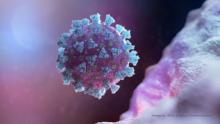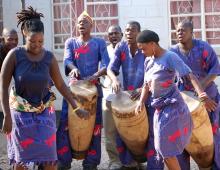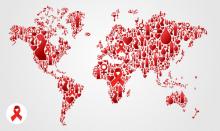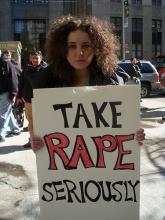pandemic

Economic, social, and political inequality affects everything — including the new coronavirus: who gets it, how they are treated, the chances for recovery, job security, etc. Our Sojourners team looked at that question this week: How is our deep and shameful inequality in America at play as the threat of the new coronavirus rises? Here is what we found.

As people of faith, it is not uncommon to pray for miracles when faced with overwhelming obstacles. For many of us, AIDS has been one of those mind-boggling, heart-wrenching causes that has wreaked havoc on the world and been the subject of many prayers.
Since the early days of the disease, the focus has been on a cure. Researchers worked tirelessly for it and the faithful asked God to provide it. But the cure has never come.
And yet, as we mark another AIDS Day this Saturday, Dec. 1, there is evidence of the miraculous.
After 24 years of commemorating this day with grim statistics and little hope, there is finally good news.
Millions of people are receiving treatment. Many fewer people are dying.
The new infection rate has dropped by 50 percent or more in 25 countries since 2001. With access to treatment, being HIV-positive is now considered a chronic disease, not a fatal one.

A palpable feeling of hope and urgency hung heavy in the air of Washington, D.C., this week as thousands of activists descended on the nation’s capital to encourage and inspire colleagues and decision-makers to “turn the tide on AIDS.”
The International AIDS Conference 2012 has returned to the United States, thanks in part to the lifting of the HIV/AIDS travel ban by the Obama Administration in 2010, which followed work from President George W. Bush also to lift the ban.
As part of the Conference, faith leaders from across the world were invited Tuesday morning to a forum hosted by the White House. It was an opportunity to hear from U.S. and international experts and officials, as well as come together as a community of faith, standing up against the stigma and isolation which have been two of the biggest roadblocks to achieving the goal of an AIDS-free generation.
Tuesday’s event centered around two panel discussions — one examining what the faith community uniquely brings to the table in tackling the HIV/AIDS epidemic, and the other focusing on the relationship between governments and people of faith in building the effective partnerships needed to tackle it.
The tone of the discussions was, in many ways, extremely positive. We heard about vast improvements in treatments and holistic care, services often administered by faith-based organizations around the world.
“Hope,” as White House Office of Faith-based and Neighborhood Partnerships Executive Director, Joshua DuBois, noted, is overcoming “fear.”

Earlier this week, the Burlington Free Press broke the story about the circulation of a provocative online survey among members of Sigma Phi Epsilon — the largest fraternity at the University of Vermont — which included the question: "If I could rape someone, who would it be?"
On the questionnaire, fraternity members were asked to respond to questions ranging from the benign (“Who’s my favorite artist?”) to the debauched (“Where in public would I want to have sex?”) But it was “Personal Question #3” — the hypothetical rape question — that drove the university to put the fraternity on suspension.
The University of Vermont’s chapter is under investigation by Sigma Phi Epsilon's national office. Women’s and other human rights groups in the Burlington area circulated petitions, gathered for protests on campus, and have called on the university to terminate the fraternity once and for all.
This isn't the first time the men of University of Vermont’s Sigma Phi Epsilon aka “SigEp” – a fraternity founded on the principals of “Virtue, Diligence, and Brotherly Love” – have gotten themselves in trouble. A few years ago, SigEp’s national office temporarily revoked the school’s charter, stating that the house’s hazing rituals and other risky behaviors made the organization vulnerable to lawsuits.
It’s impossible to ignore the significance of the most recent SigEp transgression in light of a very different survey released by the Centers for Disease Control and Prevention (CDC) the day after the Vermont story broke.
The CDC study found that nearly 1 in 5 American women have been raped.